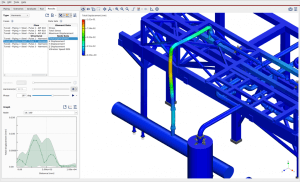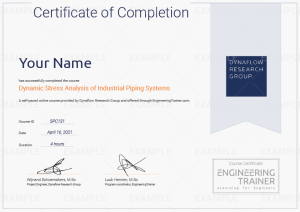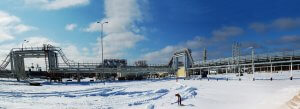
Performing Vibration Measurements: Pipe Stress Assessment
Training Courses Performing Vibration Measurements: Pipe Stress Assessment Free Course Preview Download Brochure About The Course This course teaches you all the fundamentals required for
This course covers the essential principles of dynamic stress assessment in piping systems. Through presentations, demonstrations, and case discussions, you will gain a comprehensive understanding of the theory, physics, and computational methods employed in modern pipe stress analysis for dynamic scenarios.
Topics include modal analysis, Dynamic Load Factor (DLF), spectrum analysis, and time history analysis, with thorough comparisons to help you determine the most suitable technique for your specific needs.
The course consists of 4 online modules featuring video content, providing you with 1-year of unlimited access to both the course materials and the discussion forum.
This flexibility enables you to revisit modules as necessary to refresh your knowledge for your projects.
Welcome & your instructor
Content overview
How to use this course
Questions forum
Relevance of dynamic assessment
Types of vibrations in piping systems
Vibration sources in piping systems
Vibration allowables for piping systems
Typical analysis methods for vibrating pipes
A sample of the first module is available for free, so you can learn more about the teaching style and understand if the course fits your needs.
Concepts & definitions Part 1
Concepts & definitions Part 2
Modal analysis Part 1
Modal analysis Part 2
Dynamic Load Factor (DLF) Part 1
Dynamic Load Factor (DLF) Part 2
Quasi-static analysis Part 1
Quasi-static analysis Part 2
Pipe modeling for dynamic analysis
Pipe flexibility factors for dynamic analysis
Supporting structures for dynamic analysis
Modal coordinates Solution method – part 1
Modal coordinates Solution method – part 2
Spectrum analysis Solution method – part 1
Spectrum analysis Solution method – part 2
Time history analysis Solution method
Analyzing water hammer Example – Part 1
Analyzing water hammer Example – Part 2
Harmonic analysis in piping systems
Compressor loads Example – Part 1
Compressor loads Example – Part 2
Compressor loads Example – Part 3
Compressor loads Example – Part 4
Q-Static vs. Spectrum earthquake loading – Part 1
Q-Static vs. Spectrum earthquake loading – Part 2
Recap dynamic stress analysis
This course is available in self-paced and classroom formats.
Prerequisites and level
Level: Advanced
Intended For
This course is designed for:
This course is available in self-paced, hybrid, and classroom formats.
Prerequisites and level
Intended For:
This course is designed for:
Access to the self-paced course
After your purchase is confirmed you receive an account to the EngineeringTrainer online learning portal, where you can find the course in your dashboard. After opening the course you will be guided step-by-step through the different modules. You receive 1-year unlimited access to the course, allowing for the repetition of modules as desired.
Learn by doing
The self-paced course is mainly based on video content: video lectures and video software demonstrations. English subtitles are available and videos can be viewed as many times as desired. The video lectures help you to grasp the important technical concepts and in the video demonstrations, the instructor uses the software and discusses all the steps and actions. You are recommended to follow the steps of the instructor in the software to optimize your learning curve.
The classroom course is performed in person either on-site or in the Dynaflow Research Group office located in Rijswijk, The Netherlands. This course enables you to be face-to-face with the instructors with live examples provided. This course also provides all participants with a 1-year access to the self-paced course.
Exercises are available in the form of multiple-choice quizzes to help you grasp technical concepts and in the form of .pdf files with instructions to build and analyze different models and answer related questions. Video demonstrations of the exercises are available
Participants of the self-paced course receive a personal digital certificate if they meet the following requirements:
Participants of the classroom course receive a personal physical certificate upon the completion of the course.
Example certificate:

After this course, participants are expected to:
Video lectures,
Video demonstrations,
Exercise .pdf-files for download,
Exercise answers by means of video demonstrations,
Discussions forum with other participants & instructor.
The majority of training material are videos. These are not available for download, but can be accessed directly with your account on the portal. Apart from quizzes the exercise files can be downloaded. These can include .pdf files with the exercise questions, software models or other file types.
You receive 1-year unlimited access to the course. This allows you to watch content again if this is beneficial for your work projects.
We encourage participants to submit feedback and questions in the Questions forum of the course. These are answered directly in the forum or form the basis for new videos that are added to the online course.
Participants receive 1-year unlimited access to the course including new videos that are added during this year. Participants receive an email notification upon addition of new course videos.
No software is required for participants of this course.
Demonstrations are provided using the software CaesarII, but having access to this software is not required.
If your computer and internet connection is able to play videos online (YouTube) you will be able to follow the course. Note that almost all browsers are supported, except for Internet Explorer.
Please contact us for questions on this matter.
Yes, this course qualifies for PDH hours as per the NCEES CPC Guidelines.

Training Courses Performing Vibration Measurements: Pipe Stress Assessment Free Course Preview Download Brochure About The Course This course teaches you all the fundamentals required for

Training Courses Piping: Structural Integrity About The Course Enhance your expertise in addressing technical challenges on a petrochemical plant. Join our introductory level ‘Piping Structural

Training Courses Pipe Stress Analysis Free Course Preview About The Course Pipe stress engineering is a broad area of expertise. To perform a pipe stress
Laan van Oversteen 20
6th floor
2289 CX Rijswijk
The Netherlands
© Dynaflow Research Group BV